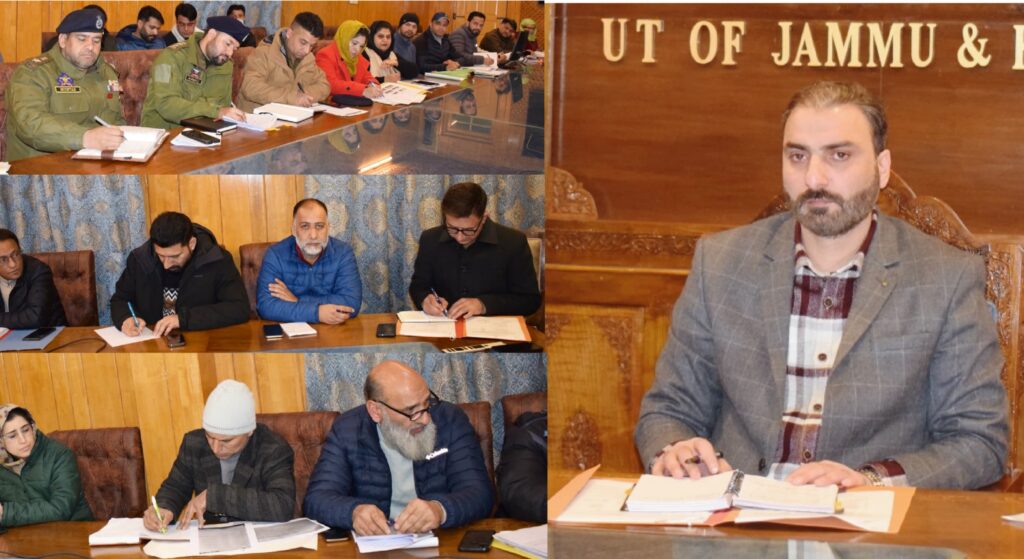DC advocates for multifaceted strategy to combat Drug Abuse in Pulwama
PULWAMA, FEBRUARY 18: The Deputy Commissioner (DC) Pulwama, Dr Basharat Qayoom chaired a review meeting of Narco Coordination Centre (NCORD) with concerned officers and highlighted the urgent need for a multifaceted strategy to combat drug abuse in the region.

He called for a multi-stakeholder collaborative approach to tackle the impact of drug abuse on individuals, families, and communities in Pulwama.
The DC emphasized the importance of addressing drug abuse through a comprehensive approach that encompasses prevention, treatment, and law enforcement. “We cannot afford to address this issue with a one-size-fits-all approach. It requires a multifaceted strategy that tackles the root causes of drug abuse while also providing support and treatment for those affected,” the Dr Basharat stated.
With initiatives aimed at educating young people about the dangers of drug abuse and promoting healthy lifestyle choices, the DC stressed the importance of engaging with schools, community organizations, and religious institutions to raise awareness and provide support to at-risk individuals.
Education department was directed to prepare an annual Nasha-Mukt calendar of activities to be implemented across all educational institutions.
Enforcement measures, including FIRs, property attachments, and reducing areas under illicit crops, were reviewed as part of a comprehensive strategy. The chair was briefed on the lodging of 153 FIRs, 26PIT NDPS Cases registered and the attachment of 7 properties in line with prior directives against the offenders.
He gave directions and suggestions to build the capacity of the enforcement wings to have a better understanding of the provisions of COTPA 2003 to implement the NTCP.
The chair was informed that special drives were conducted in eight villages of district Pulwama under Nasha Mukt Abhiyan, 19 medical shops were disallowed for non-compliance of set SOPs besides 5 licenses were suspended.
The meeting also reviewed the status of CCTV camera installation and computerized billing in retail medical shops.
Chair directed the concerned officers for saturation in CCTV installations in both wholesale and retail drug outlets.
Agriculture and allied sectors informed that 825 kanals of land have been restricted/ cleared.
The DC emphasized the need for accessible and effective treatment options for those struggling with drug abuse. Collaborating with healthcare providers and community organizations will be crucial in delivering these essential services to those in need.
He underscored the significance of robust law enforcement measures to combat the supply and trafficking of drugs in Pulwama. “We must work closely with law enforcement agencies to tackle the illegal drug trade and hold those responsible accountable for their actions,” the DC emphasized. This includes enhancing surveillance and enforcement efforts to disrupt the distribution networks of illicit substances.
Dr Basharat called for a collaborative approach that involves local government agencies, law enforcement, healthcare providers, and community organizations. “Addressing drug abuse requires a united front. By working together, we can leverage our collective expertise and resources to make a meaningful impact in our community,” he stated.
The DC announced plans to convene a task force comprising representatives from various sectors to develop and implement a coordinated strategy. The task force will be responsible for developing specific initiatives and action plans tailored to the unique needs of Pulwama.
The DC has allocated resources to enhance drug abuse prevention, treatment, and law enforcement efforts in Pulwama. These resources will be directed towards implementing targeted programs, training personnel, and strengthening coordination among relevant agencies.
He also stressed the importance of raising public awareness and reducing the stigma associated with drug abuse.
Among others the meeting was also attended by the senior officers of Police and Civil Administration.






